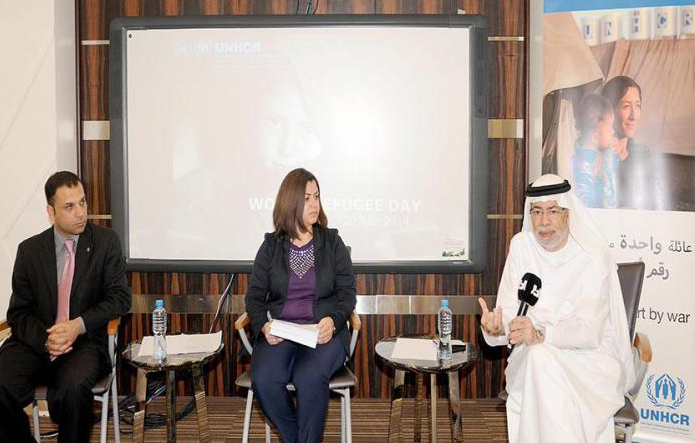ID :
332952
Sun, 06/22/2014 - 08:52
Auther :
Shortlink :
https://www.oananews.org//node/332952
The shortlink copeid
U.A.E. offered Dh2.6b in aid to refugees, says MICAD as UNHCR announces over 50m people displaced worldwide

U.A.E.'s assistance for the refugees worldwide, between 2009 and mid-2014, has amounted to Dh 2.60 billion and benefited 71 countries, said U.A.E. Ministry of Development and International Cooperation (MICAD) as the United Nations High Commissioner for Refugees (UNHCR), announced that for the first time since the World War II era, the number of people forced from their homes worldwide has surged past 50 million.
By country, the biggest populations of refugees were Afghans, Syrians and Somalis. The countries hosting the largest number of refugees were Pakistan, Iran and Lebanon. This includes 15.4 million refugees, 937,000 asylum seekers, and 28.8 million people forced to flee within the borders of their own countries, according to UNHCR's new annual 'Global Trends' report, which was presented Thursday in a special session that also saw the launch of a new report by U.A.E. Ministry of Development and International Cooperation (MICAD) on the occasion of the World Refugee Day, observed on 20 June each year, to raise awareness of the situation of refugees throughout the world.
Fadwa Habib of MICAD, in a presentation on MICAD's new report, highlighted that President His Highness Sheikh Khalifa bin Zayed Al Nahyan, Vice President and Prime Minister and Ruler of Dubai, His Highness Sheikh Mohammed bin Rashid Al Maktoum, and His Highness General Sheikh Mohamed bin Zayed Al Nahyan, Crown Prince of Abu Dhabi and Deputy Supreme Commander of U.A.E. Armed Forces, have given directives and made efforts to further advance U.A.E.'s effective international humanitarian role in helping refugees and people displaced by natural disasters and conflicts worldwide.
"From 2009 till mid-2014, U.A.E.'s assistance for the refugees worldwide has amounted to Dh 2.60 billion and benefited 71 countries. Due to the increase in natural and man-made disasters, the channelling and distribution of U.A.E's aid was made comprehensive in order to include various sectors such as water, sanitation, shelter, healthcare services, demining, coordination and support services, among others," said Ms. Fadwa Habib.
The breakdown of MICAD's figures shows that U.A.E. provided more than Dh 502.3 million in assistance for Syrian refugees at home and in neighbouring countries (2012 till June 2014), Dh 646.7 million for refugees in Pakistan in the past five year, Dh 312.8 million for Yemen, Dh 219,6 million to Libya, Dh 145 million to Afghanistan, and Dh 107.4 million to Somalia.
Habib Al Sayegh noted that humanitarian work in U.A.E. is a deeply-rooted national and Islamic tradition and represents the rich legacy of the nation's founding father, the late Sheikh Zayed bin Sultan Al Nahyan, that is followed by the President His Highness Sheikh Khalifa bin Zayed Al Nahyan.
MICAD's report also shows that between 2009 and mid-2014, the top donor of U.A.E.'s aid for refugees worldwide remains the U.A.E. government who gave Dh 1.2 billion, followed by the Red Crescent Authority (RCA) with Dh 561.8, Khalifa bin Zayed Al Nahyan Foundation (more than Dh 368 million), Dubai-based International Humanitarian City (Dh 143.2 million) and Mohammed bin Rashid Al Maktoum Humanitarian and Charity Establishment (Dh 52.5 million), while other agencies and individual donors in U.A.E. contributed Dh 184.3 million.
MICAD's report also notes that U.A.E., at a donors conference in Kuwait in January 2013, pledged US$ 300 million of which more than Dh 281 million were already disbursed.
The meeting brought together Fadwa Habib of MICAD, Mohammed Abu Asaker, Public Information and Communications Officer at UNHCR, and Habib Sayegh, Chairman of Emirates Writers Union, who also highlighted U.A.E.'s active efforts to help refugees around the world.
51.2 million people were forcibly displaced worldwide at the end of 2013, fully 6 million more than the 45.2 million reported in 2012, Mr. Abu Asaker said in the session citing UNHCR's report which is based on data compiled by governments and non-governmental partner organisations, and from the organisation's own records.
The massive increase in the number of refugees was mainly driven by the conflict in Syria. By the end of last year, 2.5 million Syrians had become refugees in neighbouring countries and more than 6.5 million had been displaced within Syria, UNHCR report says.
By region, Asia and the Pacific had the largest refugee population overall at 3.5 million people. Sub-Saharan Africa had 2.9 million people, while the Middle East and North Africa had 2.6 million.
In addition to refugees, 2013 saw 1.1 million people submitting applications for asylum, the majority of these in developed countries (Germany became the largest single recipient of new asylum claims). A record 25,300 asylum applications were from children who were separated from or unaccompanied by parents. Syrians lodged 64,300 claims, more than any other nationality, followed by asylum seekers from Democratic Republic of the Congo (60,400) and Myanmar (57,400).
The UN General Assembly, on 4 December 2000, adopted Resolution No. 55/76 in which it decided that, from 2001 which marked the 50th anniversary of the 1951 Convention relating to the Status of Refugees, 20 June would be celebrated as World Refugee Day. – Emirates News Agency, WAM





